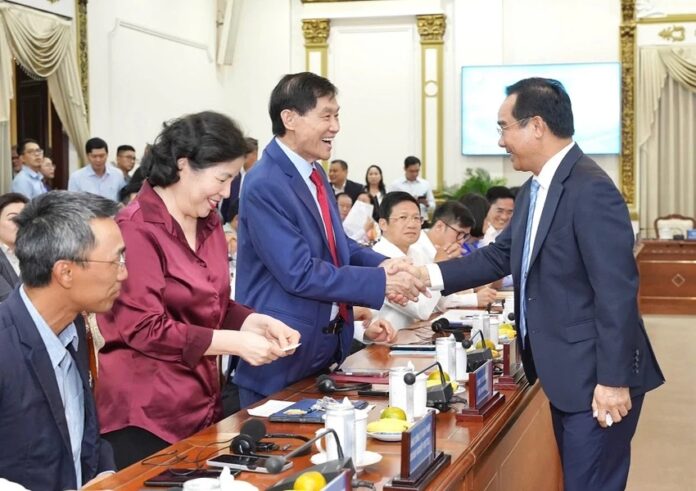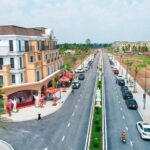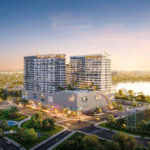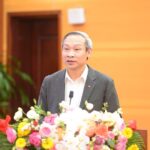On March 6th afternoon, the People’s Committee of Ho Chi Minh City organized a conference to meet with leaders of domestic and foreign enterprises in the area. The purpose of this gathering was to listen to suggestions and strategies to improve the investment environment and discuss future cooperation orientations.
Real estate businesses paralyzed by red tape
Mr. Nguyen Van Duoc, Chairman of the People’s Committee of Ho Chi Minh City, shared that the city’s goal for 2025 is to achieve double-digit growth and remove obstacles for businesses, creating a favorable investment climate. This will enable the city to develop to its full potential and contribute significantly to the country’s overall development.
Mr. Duoc acknowledged that achieving double-digit economic growth for the city requires addressing multiple issues. Ho Chi Minh City has short- and long-term plans, solutions, and strategies to tackle these challenges.
“We look forward to hearing the contributions of enterprises to achieve these goals. What does the city need to do? How will businesses accompany the city to achieve victory?” he asked.
“The city hopes for candid and heartfelt discussions with businesses. We will take on board your suggestions and devise solutions to help enterprises investing in Ho Chi Minh City achieve greater success. Simultaneously, we aim to propel the city towards double-digit growth and establish it as a growth pole for the nation,” expressed Mr. Duoc.
At the meeting, Mr. Nguyen Ngoc Hoa, Chairman of the Ho Chi Minh City Business Association, pointed out that administrative procedures are currently hindering the development of the business community.
According to Mr. Hoa, the recent directive from the General Secretary regarding the reduction of 30% of administrative procedures showcases a positive signal. This matter needs to be urgently addressed.
For Ho Chi Minh City, the association proposed a mechanism to work with departments in various fields to identify which procedures need to be eliminated or improved. Additionally, there is a need to change the working methods. For instance, when a department makes a decision, they must seek the opinions of 5-7 related departments and wait for their feedback before finalizing the decision.
Therefore, the association suggested that when issuing a document requesting opinions, there should be a deadline for responses. If the full set of feedback is not received by the deadline, the department can proceed with the decision. This will prevent businesses from experiencing lengthy waiting times and enhance the proactive role of the leading departments.
“Furthermore, enterprises expect the city to focus on boosting public investment and creating opportunities for businesses to participate as satellite units in these projects, generating effective revenue,” added Mr. Hoa.
Ms. Duong Thanh Thuy, Vice President of the Trung Thuy Group, shared that many real estate businesses are currently “paralyzed” by administrative procedures. As an example, Trung Thuy Group has two projects that have been ongoing for ten years without completion. “To achieve double-digit growth for Ho Chi Minh City, it is essential to first reform the regime and streamline administrative procedures,” stated Ms. Thuy.
A representative from the Sungroup shared that while Ho Chi Minh City is the country’s economic hub, public investment has not met the plan, and private investment faces numerous obstacles. “We have noticed that some legal dossiers with 95% completion are still encountering hurdles. Therefore, in the short term, Ho Chi Minh City needs to reform administrative procedures and classify all obstacles for processing,” the representative from Sungroup informed.
|
We are preparing for the first meeting to assign tasks and responsibilities to the comrades in the Standing Committee of the Committee, each department in charge of resolving these issues. This year, we aim to resolve around 500 public and private projects that are facing obstacles before September, in the spirit of the direction of the Chairman of the People’s Committee of Ho Chi Minh City. Vo Van Hoan, Vice Chairman of the People’s Committee of Ho Chi Minh City |
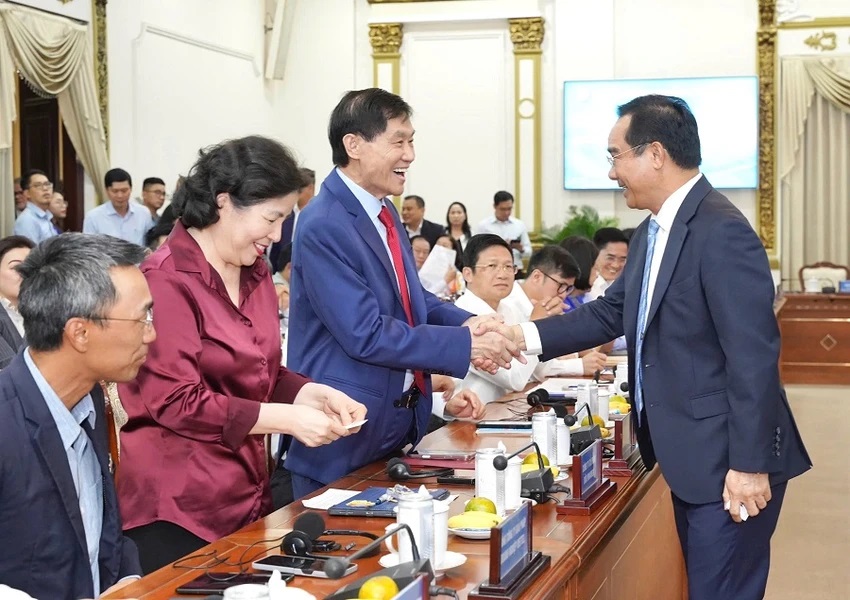
Chairman of the People’s Committee of Ho Chi Minh City, Nguyen Van Duoc, meets with enterprises. Photo by THUAN VAN
|
Ho Chi Minh City needs to develop more high-end commercial and service centers
According to Mr. Duoc, the economic structure of Ho Chi Minh City currently comprises construction industry (34%) and services (65%). There is limited land available for industrial development, while commerce and services remain unstable and lack adequate infrastructure.
Experts assess that the city’s development has reached its threshold. Therefore, without increasing supply, it will be challenging for the city’s economy to attain double-digit growth. Hence, new factors such as green and digital transformation are necessary.
Ho Chi Minh City is preparing to construct a Complex Center for Digital Transformation in Thu Duc City to implement the idea of “4-in-1,” encompassing AI, an innovation center, a semiconductor chip center, a big data center, and an international financial center in Ho Chi Minh City, along with a transshipment port.
The city’s leaders requested enterprises to provide additional feedback on this matter.
Mr. Jonathan Hanh Nguyen, Chairman of the IPP Group, shared that many of their partners are highly interested in the International Financial Center in Ho Chi Minh City. This center will attract global financial resources to the city, contributing to its economic revival. Regarding commercial services, the IPP Group owns 139 prominent global brands in Vietnam and faces little competition.
IPP has invested in the high-end Tràng Tiền Plaza shopping center in Hanoi, introducing over 100 brands to the capital. However, Ho Chi Minh City has not yet realized a similar project. Additionally, while many countries have numerous duty-free shops, Ho Chi Minh City lags in this regard.
According to Mr. Jonathan Hanh Nguyen, visitors to Ho Chi Minh City seek not only souvenirs from Ben Thanh Market but also desire a high-end shopping experience. “I hope that Ho Chi Minh City will immediately develop a high-end shopping center like Tràng Tiền Plaza and a Dowton Duty-Free zone. Moreover, there is a need for a factory outlet center, offering discounts of up to 40%, which would be very appealing to tourists,” he added.
Mr. Hanh Nguyen, known as the “luxury king,” explained that after six months or a year, the company conducts a re-export of luxury goods, and tourists flock to factory outlet zones in France, the US, and Italy to purchase these items.
“Why don’t we bring these luxury brands to an outlet in Ho Chi Minh City? If the city is interested, we are ready and committed to attracting at least 2-5 million visitors to the city,” he assured.
The representative from Sungroup emphasized that while Ho Chi Minh City welcomes 38 million visitors, including 6 million international tourists, it primarily serves as a transit point rather than a destination where visitors spend significantly. Therefore, the city needs large parks and other attractions.
Additionally, Ho Chi Minh City boasts many five-star hotels that were established long ago, but in the last decade, there has not been a significant addition of new five-star accommodations. Thus, there is a demand for more five- and six-star hotels and resorts to accommodate billionaire visitors and state leaders.
Ms. Thuy agreed with Mr. Jonathan Hanh Nguyen’s suggestions. She emphasized the need for shopping destinations to attract tourists and serve the city’s population of over ten million people, offering dining, entertainment, and shopping experiences. This will enable the city to collect taxes from these service businesses.
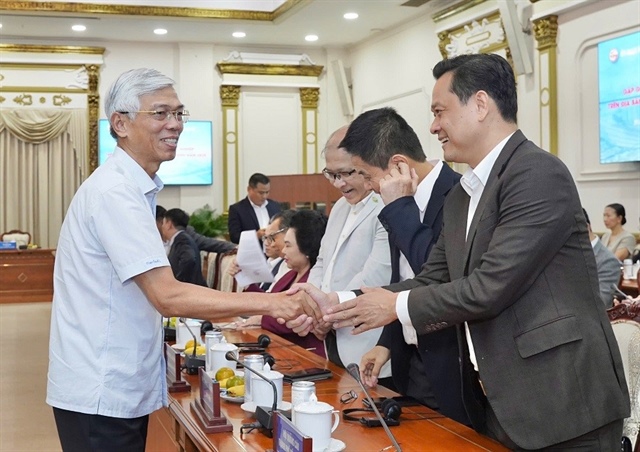 Chairman of the People’s Committee of Ho Chi Minh City, Nguyen Van Duoc, meets with enterprises. Photo by THUAN VAN At the meeting, the American, Japanese, and Chinese business associations provided valuable contributions to the leaders of the People’s Committee of Ho Chi Minh City. Vice Chairman of the People’s Committee of Ho Chi Minh City, Vo Van Hoan, shared that many American businesses are concerned about the global minimum tax rate and the US tax policy. Vietnamese enterprises might also be impacted by these changes. Therefore, we welcome the insights of the business community in Ho Chi Minh City on this matter. Mr. Dinh Hong Ky, Vice Chairman of the Ho Chi Minh City Business Association, noted that in 2024, Vietnam’s exports to the US had a surplus of 123 billion VND. According to statistics from the Ministry of Industry and Trade, 70% of this surplus belongs to foreign-invested enterprises (FDI). This raises the question of whether Vietnam is positioned as a production center or merely a transit point in the global supply chain. Therefore, it is suggested that Ho Chi Minh City, on the one hand, should continue to attract FDI and, on the other hand, implement policies to encourage FDI enterprises to prioritize the use of Vietnamese industrial supporting products. For instance, Samsung, a significant exporter from Vietnam, accounts for a considerable proportion of the 123 billion VND surplus in exports to the US market. However, only four Vietnamese enterprises are currently part of Samsung’s supply chain out of 63 participating companies. At the same time, the city should establish preferential mechanisms for Vietnamese enterprises investing in the city’s High-Tech Park to participate in the global supply chain. Mr. Ky believes that the US tax policy will impact Vietnam’s exports and significantly affect Vietnamese export sectors that bring high added value, such as seafood and wood industries. |
TU UYEN-THUAN VAN
– 21:26 06/03/2025
The Tân Vạn Interchange: Unlocking the East with a Billion-Dollar Infrastructure Boost
The Tan Van Interchange is an impressive feat of engineering and the largest and most complex interchange on the Ring Road 3. With a staggering investment of over VND 1,800 billion, it serves as a vital gateway for trade and commerce in the East region, seamlessly connecting Ho Chi Minh City, Di An, and Bien Hoa.
Introducing the Future of Living: TTC Plaza Da Nang’s DualKey Concept
Dual-key apartments at TTC Plaza Da Nang present an innovative approach to urban living, offering both flexibility and income potential. With a rising demand for multifunctional spaces, these apartments provide an ingenious solution.
Mastering the Art of Persuasion: The Ultimate Guide to Writing Compelling Copy and Captivating Customers
SHS Hanoi-Saigon Securities Corporation (HNX: SHS) has announced that April 25th is the deadline for shareholders to register to receive a substantial 20% dividend payout in cash and stocks. This announcement underscores SHS’s unwavering commitment to protecting shareholders’ interests and enhancing their investment value.

